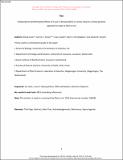Validating the demethylating effects of 5-aza-2'-deoxycytidine in insects requires a whole-genome approach (A reply to Ellers et al.)
Abstract
We previously demonstrated that treatment with the demethylating agent 5-aza-2′-deoxycytidine (5-azadC) alters the offspring sex ratios produced by females of the parasitoid wasp Nasonia vitripennis (Cook et al. 2015). Females allocate offspring sex ratio in line with Local Mate Competition theory, producing more or less female-biased sex ratios as the number of other females laying eggs on a patch varies, thereby reducing competition amongst their sons for mates. Interestingly, treatment with 5-aza-dC did not ablate the facultative sex allocation response. Instead, sex ratios became less female-biased, a shift in the direction of the optimum sex ratio for paternally-inherited alleles according to genomic conflict theory. This was the first (albeit indirect) experimental evidence for genomic conflict over sex allocation. Ellers et al. (2019) have since assayed the effects of 5-aza-dC on DNA methylation in ten Nasonia genes, finding no evidence of demethylation in these 10 genes, from which they conclude that 5-aza-dC has no demethylating capability in Nasonia vitripennis. Quantifying the efficacy of 5-aza-dC in terms of demethylation is indeed crucial to in-depth interpretation of studies using 5-aza-dC to link phenotypes to epigenetic regulation. Here, we outline the mode of action of 5-aza-dC and demonstrate that determining the efficacy of 5-aza-dC in insect systems requires a whole-genome approach.
Citation
Cook , N , Parker , D J , Tauber , E , Pannebakker , B A & Shuker , D M 2019 , ' Validating the demethylating effects of 5-aza-2'-deoxycytidine in insects requires a whole-genome approach (A reply to Ellers et al. ) ' , American Naturalist , vol. 194 , no. 3 . https://doi.org/10.1086/704248
Publication
American Naturalist
Status
Peer reviewed
ISSN
0003-0147Type
Journal article
Description
This work was initiated as part of Natural Environment Research Council grant NE/J024481/1.Collections
Items in the St Andrews Research Repository are protected by copyright, with all rights reserved, unless otherwise indicated.

